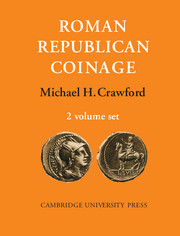Book contents
- Frontmatter
- Contents
- VOLUME I
- INTRODUCTION
- CATALOGUE
- VOLUME II
- misc-frontmatter
- 1 Technique and Technology
- 2 Weight Standards
- 3 Monetary Magistrates
- 4 Special Formulae
- 5 Administration and Control
- 6 Roman Units of Reckoning Under the Republic
- 7 Coinage and Finance
- 8 Careers of the Moneyers
- 9 Types and Legends
- 10 Art and Coinage
- Plates
- Indices
- Plate section
5 - Administration and Control
from VOLUME II
Published online by Cambridge University Press: 07 October 2011
- Frontmatter
- Contents
- VOLUME I
- INTRODUCTION
- CATALOGUE
- VOLUME II
- misc-frontmatter
- 1 Technique and Technology
- 2 Weight Standards
- 3 Monetary Magistrates
- 4 Special Formulae
- 5 Administration and Control
- 6 Roman Units of Reckoning Under the Republic
- 7 Coinage and Finance
- 8 Careers of the Moneyers
- 9 Types and Legends
- 10 Art and Coinage
- Plates
- Indices
- Plate section
Summary
The production of an issue of coinage under the Roman Republic involved two separate stages, which must be carefully distinguished. It was necessary both to decide what denominations were to be issued and to fix the total amount of coinage to be issued at anyone time together with its distribution over the various denominations. Clear evidence exists that a law was necessary or at least customary for the initial adoption of a particular denomination or weight standard. When a large number of denominations were available it was presumably a matter of administrative discretion which ones were actually used and in what proportions. The total amount of coinage issued was normally under Senatorial contro1. These rules, with all others, broke down in the period of Civil War from 49 onwards.
THE PEOPLE
Two laws governing the denominational structure of the Republican coinage are clearly attested, the Lex Clodia and the Lex Papiria (Pliny, NH xxxiii, 46 - is qui nunc victoriatus appellatur, lege Clodia percussus est, the coin which is now called the victoriatus was (first) struck under the terms of the Lex Clodia, and mox lege Papiria semunciarii asses facti, soon the as was made semuncial under the terms of the Lex Papiria). The first of these, the Lex Clodia, effectively legalised the current practice with regard to the victoriatus, according to which this old coin weighing threequarters of a denarius was treated as half of a denarius (see p. 628), and at the same time perhaps authorised the issue of a new coin, of the weight of a quinarius and with more or less the types of the old victoriatus. The law was presumably, though not necessarily, passed shortly before the new quinarius was first struck in 101. It was doubtless tribunician, but its author is not identifiable.
Although there were considerable periods in the first century B.C. when the new quinarius was not issued, Pliny implies that the Lex Clodia continued to be regarded as the source of authority for the issue of the quinarius to the end of the Republic and beyond.
The prime purpose of the Lex Papiria of 91 (for the date see p. 77, for the reasons behind it see p. 596) seems to have been to authorise the production of bronze, including the as, on a weight standard of half an ounce instead of an ounce.
- Type
- Chapter
- Information
- Roman Republican Coinage , pp. 610 - 620Publisher: Cambridge University PressPrint publication year: 1975



